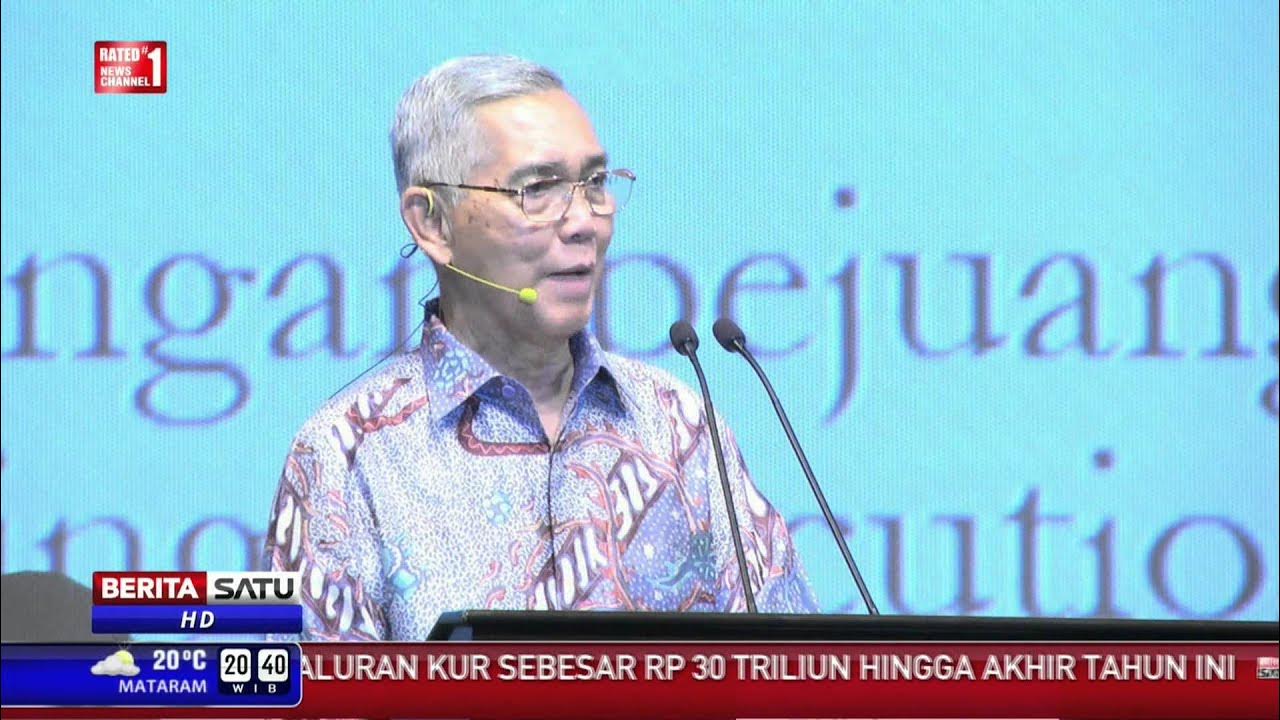[FULL] Pidato Terakhir Presiden Jokowi di Sidang Tahunan MPR 2024 Jelang HUT ke-79 RI
Summary
TLDRThe speaker reflects on 10 years of leadership as the President of Indonesia and five years alongside Vice President Maruf Amin. They express gratitude for the support from the people, highlighting achievements such as infrastructure development, economic growth, and social programs. The speaker acknowledges the challenges faced and the progress made, while also asking for forgiveness for any shortcomings. The speech concludes with a message of unity and hope for Indonesia's future under the leadership of President-elect Prabowo Subianto.
Takeaways
- 👏 President of Indonesia delivered his final state address on August 16, 2024, after serving 10 years.
- 🙏 He expressed deep gratitude to the Indonesian people and acknowledged the support and prayers he received during his presidency.
- 🛣️ Significant infrastructure achievements include the construction of 366,000 km of village roads, 2,700 km of new toll roads, and 6,000 km of national roads.
- 📉 Indonesia reduced extreme poverty from 6.1% to 0.8% and decreased stunting from 37% to 21.5% during his tenure.
- 💼 The government created over 200,000 jobs through smelter and processing industries for nickel, bauxite, and copper.
- 💡 The president highlighted Indonesia's advancements in digitalization, including reaching 99% electrification and 79% internet coverage in 2024.
- 🌍 Indonesia aims to be a leader in green energy, leveraging its vast potential in water, wind, solar, geothermal, and bioenergy.
- 📚 Major legal reforms were accomplished, including the new criminal code and laws protecting women and children from sexual violence.
- 🤝 The president apologized for any shortcomings during his term and asked for forgiveness from the people of Indonesia.
- 🇮🇩 He announced that Prabowo Subianto will take over as the next president in October 2024, expressing hope for Indonesia's future progress.
Q & A
What significant milestones did the speaker achieve during his 10-year presidency?
-The speaker highlighted several achievements, including building 366,000 km of village roads, 2,700 km of new toll roads, 50 new ports and airports, 43 new dams, and reducing logistics costs from 24% to 14%.
How did Indonesia's economy perform under the speaker's leadership, particularly during global challenges like the COVID-19 pandemic?
-Indonesia's economy remained resilient with a consistent growth rate of around 5%, even as many other countries struggled. Eastern regions like Papua and Maluku grew by over 6%, while Maluku Utara achieved over 20% growth. Inflation was controlled at 2-3%.
What was the impact of the speaker's policies on poverty, stunting, and unemployment rates?
-Poverty was reduced from 6.1% to 0.8%, stunting decreased from 37% to 21.5%, and unemployment was reduced from 5.7% to 4.8%.
What initiatives were taken to support education and healthcare in Indonesia?
-The government spent 361 trillion Rupiah on the Indonesia Health Card, benefiting 92 million people annually, and 103.1 trillion Rupiah on the Indonesia Smart Card, helping 20 million students per year. Additionally, 25 trillion Rupiah was allocated to the Family Hope Program, benefiting 10 million families annually.
How did the speaker address the issue of exporting raw materials from Indonesia?
-The speaker emphasized the importance of processing raw materials domestically to increase productivity and value. This approach started with nickel, bauxite, and copper and created over 200,000 jobs while generating significant revenue for the country.
What steps did the speaker take towards energy transition and sustainability in Indonesia?
-Indonesia focused on harnessing its vast renewable energy potential, including 3,600 GW from sources like water, wind, solar, geothermal, ocean waves, and bioenergy. The speaker stressed the need for a just and accessible energy transition.
How did the speaker contribute to the digitalization and technological advancement of Indonesia?
-The speaker initiated 'Ina Digital,' an integrated government digital service. Electrification reached 99%, and internet coverage expanded to 79%, supporting the digitalization of SMEs and the growth of startups.
What reforms did the speaker introduce in Indonesia's legal system?
-Significant reforms included the enactment of a new Criminal Code, the Omnibus Law on Job Creation, and the Law on Sexual Violence Crimes. These efforts aimed to modernize the legal framework and provide stronger protection, especially for women and children.
What message did the speaker convey in the final part of his speech regarding the future of Indonesia?
-The speaker expressed gratitude to the Indonesian people, acknowledged any shortcomings, and called for continued unity and collaboration to achieve the country's future goals. He also expressed confidence in the leadership of the incoming president, Prabowo Subianto.
How did the speaker emphasize the importance of national unity in his speech?
-The speaker highlighted that Indonesia's progress was built on the foundation of unity, hard work, and cooperation among its people and institutions. He called for the preservation of these values to ensure continued national development.
Outlines

このセクションは有料ユーザー限定です。 アクセスするには、アップグレードをお願いします。
今すぐアップグレードMindmap

このセクションは有料ユーザー限定です。 アクセスするには、アップグレードをお願いします。
今すぐアップグレードKeywords

このセクションは有料ユーザー限定です。 アクセスするには、アップグレードをお願いします。
今すぐアップグレードHighlights

このセクションは有料ユーザー限定です。 アクセスするには、アップグレードをお願いします。
今すぐアップグレードTranscripts

このセクションは有料ユーザー限定です。 アクセスするには、アップグレードをお願いします。
今すぐアップグレード関連動画をさらに表示

[FULL] Pidato Presiden Jokowi dalam Sidang Tahunan MPR RI 2024 | Beritasatu

PELANTIKAN PRESIDEN DAN WAKIL PRESIDEN - PRABOWO SUBIANTO DAN GIBRAN RAKABUMING

PESAN MISTERIUS DIBALIK PIDATO PRESIDEN PRABOWO| 4-5 TAHUN Kedepan INDONESIA SWASEMBADA PANGAN ??

PELANTIKAN PRESIDEN PRABOWO SUBIANTO & WAPRES GIBRAN RAKABUMING | KABAR KABINET 19 S.D 25 OKT 2024

Article 2: The Executive Branch

Supermentor: Sosok Try Sutrisno # 1
5.0 / 5 (0 votes)
